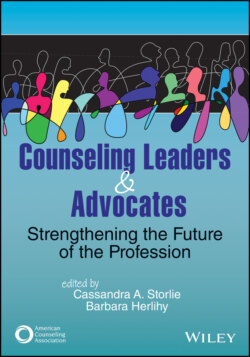Читать книгу Counseling Leaders and Advocates - Группа авторов - Страница 38
Chronosystem
ОглавлениеThe chronosystem represents the environmental and sociohistorical influences that prompt changes over time. In the counseling profession, leaders can acknowledge this and recognize that things will change over time, and we hope they will change for the better. In our current sociopolitical climate, some government leaders are endorsing and actively taking action against long-standing issues of racism and discrimination by endorsing the removal of some historic statues from communities and military bases or by supporting reparations for Black citizens.
BLM advocacy step. Culturally responsive counseling leaders can openly acknowledge the BLM movement and model the reflexive behavior associated with cultural responsiveness in the context of their leadership role, which directly supports and aligns with the BLM movement. This action requires an ongoing assessment and consideration of what and how they can learn in this moment and requires the transition from reflection to action by finding ways to acknowledge and support the changing tide in their respective communities and overall counseling profession.
Evaluation of the effectiveness of this advocacy step. Evaluating culturally responsive counseling leaders’ effectiveness in implementing this advocacy step requires leaders to publicly acknowledge the environmental and sociopolitical influences responsible for shifting the paradigm. It also requires leaders to align themselves with others in support of BLM and the ACA divisions supporting those shifts. This evaluation requires a personal and professional assessment of how and why counseling leaders take such action.
• • •
As you further explore and understand your role as a current/future culturally responsive counseling leader, we encourage you to explore the Journal of Counseling & Development July 2020 special issue titled “Integrating the Multicultural and Social Justice Competencies Into Practice, Research, and Advocacy,” wherein multiple authors examine the “transformative opportunities that the MSJCC have to influence counseling”(Singh & Nassar, 2020, p. 235). Singh et al.’s (2020) call to use the MSJCC to decolonize counseling practice has an important bearing on how professional counseling leaders (e.g., national, regional, elected, appointed) can make clear connections with the BLM movement and the MSJCC. The authors suggest four key multicultural and social justice theories as a mechanism to disrupt White supremacist hegemony and implement their use of MSJCC in practice: relational-cultural theory (Miller, 1976), critical race theory (Bell, 1995), intersectionality theory (Crenshaw, 1989), and liberation psychology (Martín-Baró, 1994). Finally, Na and Fietzer (2020), in the same issue, report on the relationship of a sample of more than 150 counselors’ social justice engagement and demographic, personality, and contextual factors. They suggest that counselor training and, by proxy, counseling leaders’ choices about social justice should be focused on quality over quantity and that awareness of individual personality and identity characteristics should be considered in supporting such engagement.
